In recent years, with the rapid development of blockchain, developers are facing a retrieval dilemma due to the vast amount of NFT asset data. The explosive growth of NFT assets on public chains presents a challenge as these assets are numerous and diverse, spread across different blockchains. This requires significant time and effort to parse and clean the data, posing a major challenge for NFT application developers — how to efficiently retrieve NFT data?
As of August 14, 2023, NFTScan currently supports 16 mainstream blockchain networks, generating a total of 2,658,452 NFT contracts, 1,005,025,576 NFT assets, 1,922,619,688 NFT on-chain records, 134,009,635 NFT trading active wallet addresses, a total NFT market cap of $13,523,058,924, and a historical NFT trading volume of $65,130,304,272.
Developers are currently facing many challenges in obtaining and utilizing NFT data. Firstly, NFT data is distributed across numerous public chains that are fragmented and lack interoperability, making it difficult to aggregate NFT data from different chains for unified access. Secondly, even on the same public chain, there is a vast array of NFT projects, making the task of retrieving NFT metadata and transaction information a substantial undertaking.
Currently, developers struggle to find convenient tools for manually obtaining NFT data. Many exceptional teams are building NFT developer tools, with platforms like NFTScan serving as data infrastructure providers. These NFT-related data platforms offer a simple and effective solution through NFT APIs. Developers can easily access on-chain NFT data through these API interfaces and analyze, process, aggregate, and visualize the data.
How to Access NFTScan NFT API
1/ Create an NFTScan Developer Account
Before using the NFTScan API, visit the developer website and create an account. Register by clicking the “Sign Up” button on the NFTScan API page.
https://developer.nftscan.com/user/signup
After logging in, find your unique API KEY on the Dashboard. Access the API documentation and enter your API KEY where required. Follow the instructions in the documentation to start using the API services. The API documentation provides various interface modes for developers to choose the most suitable one based on their needs.
In the Dashboard, developers can also view statistical data about their API usage, aiding in tracking historical usage. Additionally, NFTScan provides each registered developer with 1M CU of API calls, allowing requests for all NFT API interfaces, and these CUs never expire.
2/ View NFT API Documentation
After successfully registering and obtaining an API Key, you need to review the NFTScan API documentation. The API documentation contains all available API endpoints, parameters, and detailed information on building requests and handling responses. Carefully read the API documentation and ensure you understand how to use the API to retrieve the required data. NFTScan API services aim to enhance the NFT data analysis experience for developers.
NFTScan currently boasts the most extensive NFT Collection library across the network, supporting a comprehensive range of NFT data from 16 blockchains including Ethereum, Solana, BNBChain, Bitcoin, Polygon, zkSync, Aptos, Linea, Avalanche, Arbitrum, Optimism, Fantom, Moonbeam, PlatON, Cronos, and Gnosis. The covered NFT data is diverse and rich, offering a complete set of interfaces for obtaining ERC721 and ERC1155 assets, transactions, project statistics, and market information. The platform now supports over 50 public interfaces for EVM-compatible chains, along with a batch of interfaces for Solana, Aptos, and Bitcoin, meeting developers’ needs to index various types of NFT data.
3/ Retrieve NFT Asset-Related APIs
- Get NFTs by Account Retrieve NFTs associated with an account address.
- Get All NFTs by Account Retrieve all NFTs owned by an account address. NFTs are grouped by contract addresses. If an account address holds more than 2000 NFTs, the returned NFTs will be limited to 2000 or fewer. In such cases, developers and users can perform paginated queries to fetch all NFTs owned by the account.
- Get Minted NFTs by Account Retrieve NFTs minted by a specific account address.
- Get NFTs by Contract Retrieve NFTs using a contract address and sort them in ascending order based on token_id.
- Get Single NFT Retrieve a single NFT.
- Get Multiple NFTs Retrieve multiple NFTs from different contract addresses simultaneously.
- Search NFTs This API returns a list of NFT assets by applying search filters in the request body. Assets are sorted in ascending order of nftscan_id. Note: When filtering data using only the block_number condition, the range between block_number_start and block_number_end should not exceed 10000.
- Get NFTs by Attributes This API returns a group of NFTs belonging to contract addresses with specific attributes. NFTs are sorted in ascending order based on token_id.
- Get All Multi-Chain NFTs by Account This API returns all multi-chain NFTs owned by an account address, with NFTs grouped by contract addresses.
These APIs significantly simplify the complexity of retrieving cross-chain NFT data for developers. They offer a comprehensive range of data across different chains, making them highly applicable in scenarios like data querying, visualization, and analysis. Built on reliable APIs, they greatly enhance development efficiency.
1. Get all NFTs by account
“/v2/account/own/all/{account_address}” — In this interface, we’re requesting all NFTs owned by the whale address:
0xca1257ade6f4fa6c6834fdc42e030be6c0f5a813.
Clicking “Try it” reveals the response showing a total of 349 items under this address, grouped in intervals of 100. It provides descriptions of basic information for certain top-level NFT collections held by this address, like BoredApeYachtClub (BAYC).
Collection address: 0xbc4ca0eda7647a8ab7c2061c2e118a18a936f13d Name: BoredApeYachClub Total items: 10,000 Owned by address: 26 Symbol: BAYC Floor price: 30 ETH
Collection address: 0x60e4d786628fea6478f785a6d7e704777c86a7c6 Name: MutantApeYachtClub Total items: 19,481 Owned by address: 23 Symbol: MAYC Floor price: 5.7399 ETH
Collection address: 0xba30e5f9bb24caa003e9f2f0497ad287fdf95623 Name: BoredApeKennelClub Total items: 9,602 Owned by address: 23 Symbol: BAKC Floor price: 2.1878 ETH.
2. Get all multi-chain NFTs by account
“/v2/assets/chain/{account_address}” — This interface retrieves all NFT assets across various chains for a wallet address. It offers a global analysis of user behavior and provides a data foundation for cross-chain applications.
In this instance, we’re examining the whale address 0xca1257ade6f4fa6c6834fdc42e030be6c0f5a813. Clicking “Try it” reveals activity on Ethereum and BNBchain, showing 349 Collections on the ETH network and 2 Collections on the BNB network, along with precise item data analysis.
3. Get NFTs by contract
“/v2/assets/{contract_address}” — This interface fetches a list of all NFT assets generated under a specified contract address. It has applications such as retrieving all NFTs within a project or obtaining metadata for multiple token IDs.
To acquire all NFTs within a specific NFT project, you can easily retrieve a list of all NFT IDs generated by that project by filtering according to its contract address.
For bulk retrieval of NFT metadata based on contract addresses, you can first obtain all tokenIDs through the contract address, and then retrieve the metadata for each tokenID in bulk.
Constructing yield analysis for NFT projects involves gathering the total number of NFTs deployed within different time periods, enabling an analysis of the project’s growth trajectory.
To track the circulation of NFTs within a contract address, you can periodically fetch the NFT list within the contract, thereby detecting incoming and outgoing NFTs.
The data response showcases fundamental information and metadata for all items within the NFT Collection. For instance, using Bored Ape Yacht Club as an example, data is sorted by token_id. For item ID 0:
- Individual item’s basic data: Contract address: 0xbc4ca0eda7647a8ab7c2061c2e118a18a936f13d, Name: Bored Ape Yacht Club. NFT Token ID: 0, Accounting for 1% within the project, erc721 standard. Wallet address at Mint/Holder’s wallet address at Mint. Timestamp at casting/Mint hash address/Token URI address. latest_trade_price/Latest_trade_symbol/Latest_trade_timestamp is currently displayed as null, indicating no trading has occurred.
- Metadata: Metadata is hosted on IPFS, format: image/png. Storage path: ipfs://QmcJYkCKK7QPmYWjp4FD2e3Lv5WCGFuHNUByvGKBaytif4, along with detailed descriptions of the image.
- Rarity: Score of 1.08649973006184, comprehensive rarity ranking at 2273.
NFTScan not only focuses on providing API for NFT asset retrieval, but also provides multidimensional and comprehensive NFT data resources for developers. These resources cover multiple levels from NFT metadata, user data to industry data. The rich data resource types provide developers with highly customizable combination choices. Developers can freely retrieve suitable NFT data from the interface according to the actual business needs of their application.
It can be said that NFTScan provides a customized NFT data retrieval experience that is different from traditional blockchain data platforms. This not only enriches the functionality settings of applications, but also greatly reduces the cost of developers obtaining and processing NFT data. With continuous expansion and optimization of the interface, NFTScan will become the backbone of developers’ NFT data services. We look forward to developers freely unleashing their creativity here, nurturing more NFT innovative applications and promoting the development of the entire industry.
About NFTScan
NFTScan is the world’s largest NFT data infrastructure, including a professional NFT explorer and NFT developer platform, supporting the complete amount of NFT data for 15 blockchains including Ethereum, Solana, BNBChain, Arbitrum, Optimism, and other major networks, providing NFT API for developers on various blockchains.
Official Links:
NFTScan: https://nftscan.com
Developer: https://developer.nftscan.com
Twitter: https://twitter.com/nftscan_com
Discord: https://discord.gg/nftscan
NFTScan Connect Program


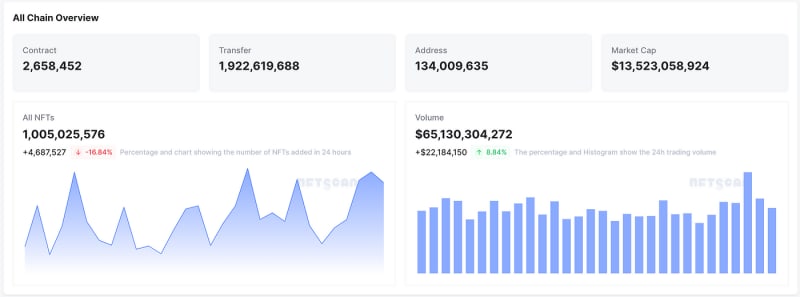
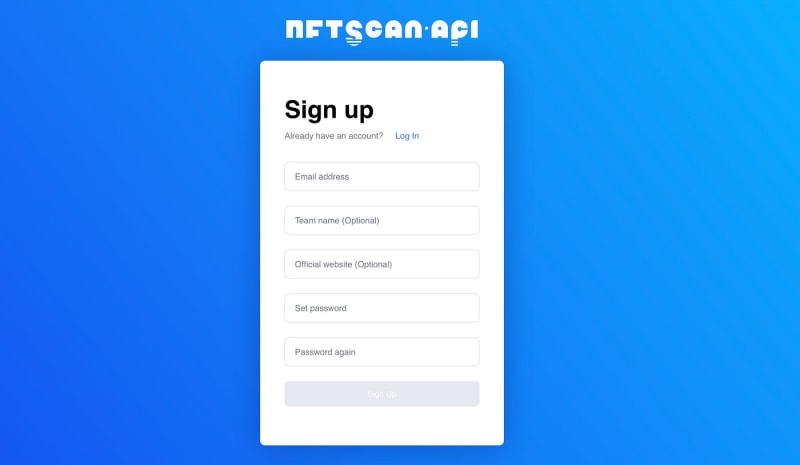
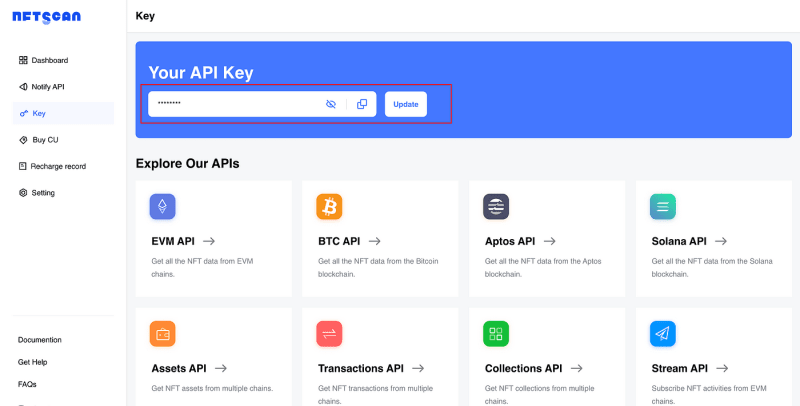
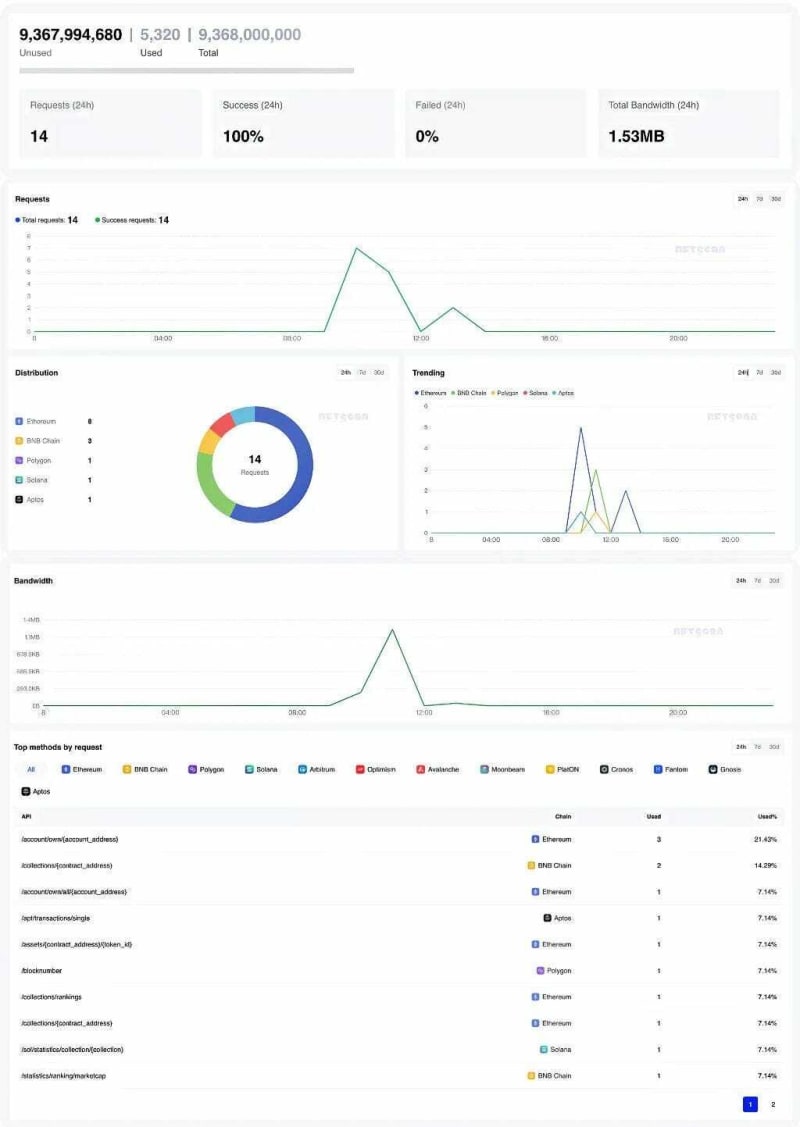

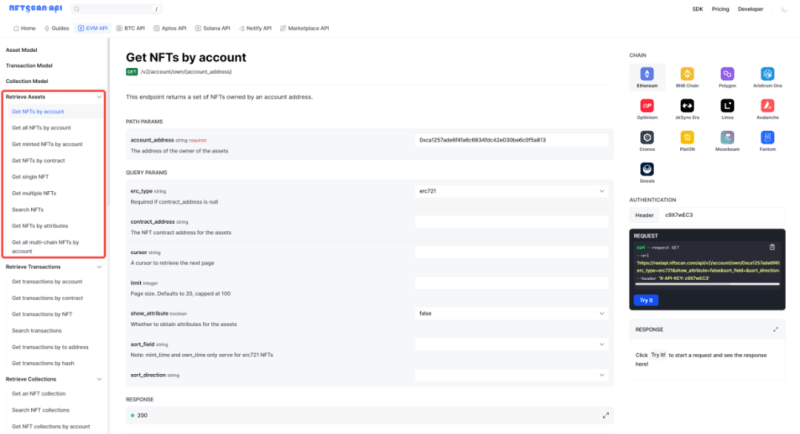
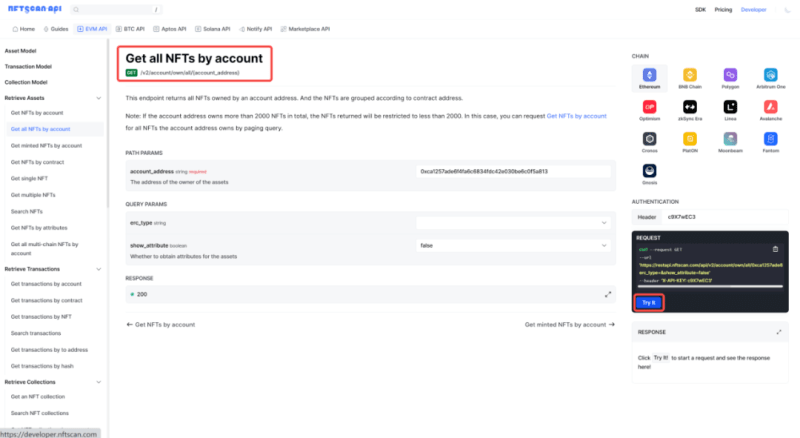
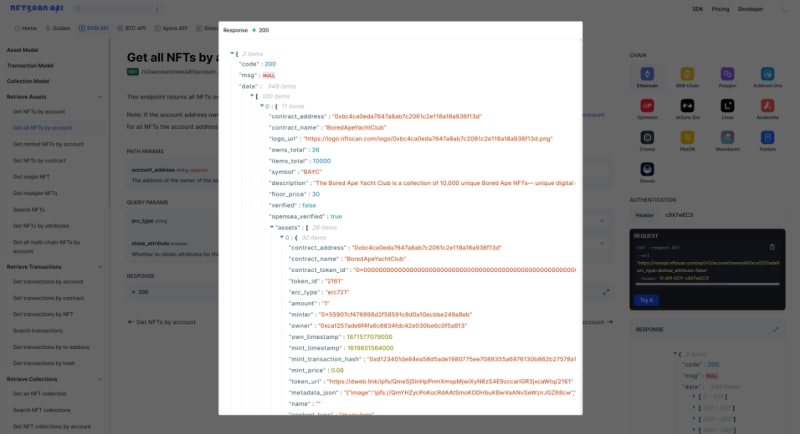
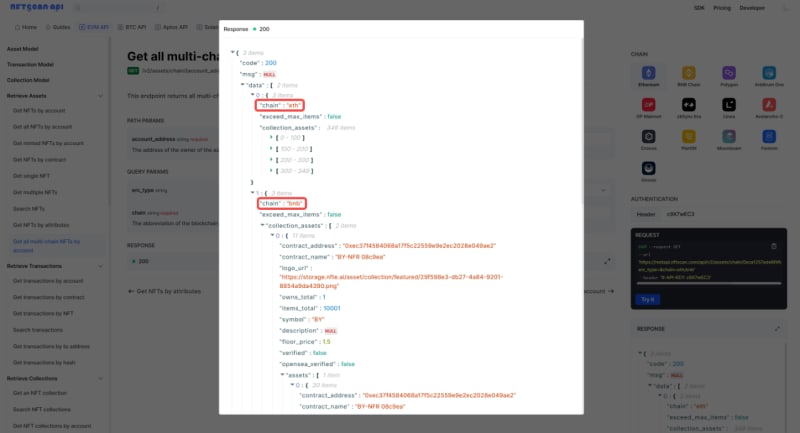
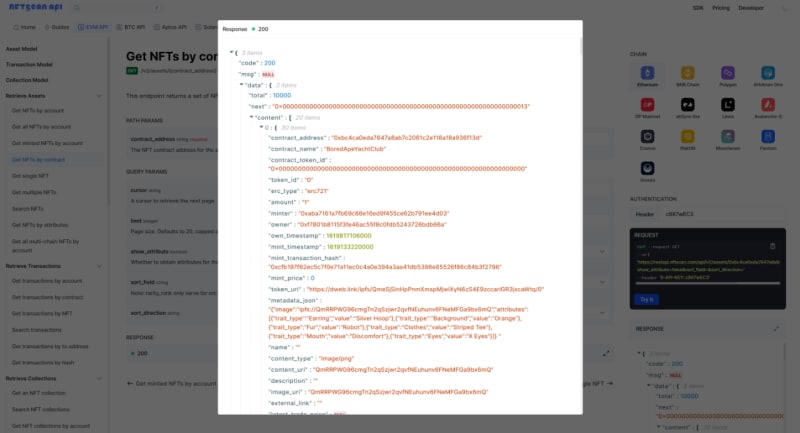






Top comments (0)